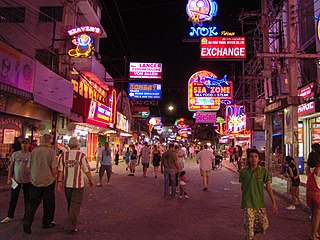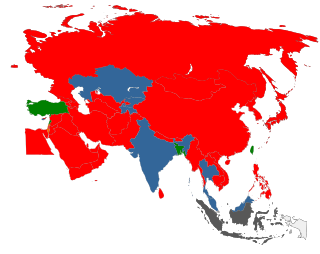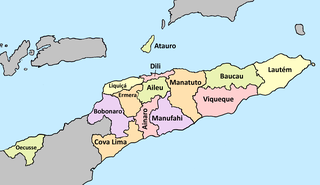Related Research Articles

Prostitution in Thailand is not itself illegal, but public solicitation for prostitution is prohibited if it is carried out "openly and shamelessly" or "causes nuisance to the public". Due to police corruption and an economic reliance on prostitution dating back to the Vietnam War, it remains a significant presence in the country. It results from poverty, low levels of education and a lack of employment in rural areas. Prostitutes mostly come from the northeastern (Isan) region of Thailand, from ethnic minorities or from neighbouring countries, especially Cambodia, Myanmar, and Laos. In 2019, the Joint United Nations Programme on HIV/AIDS (UNAIDS) estimated the total population of sex workers in Thailand to be 43,000.

The legality of prostitution in Asia varies by country. There is often a significant difference in Asia between prostitution laws and the practice of prostitution. In 2011, the Asian Commission on AIDS estimated there were 10 million sex workers in Asia and 75 million male customers.
Prostitution is illegal in Saudi Arabia, and is punishable by imprisonment and fines. Flogging was also a possible punishment until April 2020 when it was abolished by the order of the Saudi Supreme Court General Commission. Foreign nationals are also deported after punishment. If the parties are also charged with adultery, fornication and sodomy, which can apply to both the prostitute and the client since all sexual activity outside a lawful marriage is illegal, the punishment can be death.
Prostitution in Finland is legal, but soliciting in a public place and organised prostitution are illegal. According to a 2010 TAMPEP study, 69% of prostitutes working in Finland are migrants. As of 2009, there was little "visible" prostitution in Finland as it was mostly limited to private residences and nightclubs in larger metropolitan areas.
Prostitution in the Philippines is illegal, although somewhat tolerated, with law enforcement being rare with regards to sex workers. Penalties range up to life imprisonment for those involved in trafficking, which is covered by the Anti-Trafficking in Persons Act of 2003. Prostitution is available through bars, karaoke bars, massage parlors, brothels, street walkers, and escort services.
Prostitution in Senegal is legal and regulated. Senegal has the distinction of being one of the few countries in Africa to legalize prostitution, and the only one to legally regulate it. The only condition that it is done discreetly. Prostitution was first legalised in 1966. UNAIDS estimate that there are over 20,000 prostitutes in the country. The average age for a sex worker in Senegal is 28 years old and female.
Prostitution in Lebanon is nominally legal and regulated. However, no licences have been issued since 1975. In modern Lebanon, prostitution takes place semi-officially via 'super night clubs', and illegally on the streets, in bars, hotels and brothels. UNAIDS estimate there to be 4,220 prostitutes in the country.
Prostitution in Kuwait is illegal, but common. Most of the prostitutes are foreign nationals.
East Timor is a destination country for women from Indonesia, the People’s Republic of China (P.R.C.), Thailand, Malaysia, and the Philippines trafficked for the purpose of commercial sexual exploitation. Timorese women and children are vulnerable to being trafficked from rural areas or from camps for internally displaced persons to Dili with lures of employment and then forced into commercial sexual exploitation. Following the re-establishment of international peacekeeping operations in 2006, several businesses suspected of involvement in sex trafficking have reopened. Widespread internal displacement, poverty, and lack of awareness of trafficking risks could lead East Timor to become a source of vulnerable persons trafficked to other countries.
Indonesia is a source, transit, and destination country for women, children, and men trafficked for the purposes of commercial sexual exploitation and forced labor. The greatest threat of trafficking facing Indonesian men and women is that posed by conditions of forced labor and debt bondage in more developed Asian countries and the Middle East.
Prostitution in Eritrea is legal and regulated. Official figures state there are around 2,000 prostitutes in the country, who are not allowed to operate near schools, hospitals, and churches. According to the 2009 Human Rights Reports, security forces occasionally follow women engaged in prostitution and arrest those who had spent the night with a foreigner. Some women enter prostitution due to poverty. Prostitutes are known locally as "shermuta" in Arabic, or "mnzerma" and "me'amn" in Tigrinya.
Prostitution in Kosovo is illegal, and can incur a prison sentence of up to sixty days. The Global Fund to Fight AIDS, Tuberculosis and Malaria's HIV Program in Kosovo estimated there to be 5,037 prostitutes in the country. Many women turn to prostitution through poverty.
Malaysia ratified the 2000 UN TIP Protocol in February 2009.
Prostitution in Bahrain is illegal but it has gained a reputation in the Middle East as a major destination for sex tourism.
Prostitution in Mongolia is illegal but widespread in some areas. The Global Fund for Tuberculosis, HIV/AIDS and Malaria estimated there were about 19,000 sex workers in the country in 2006. Many women in Mongolia turn to prostitution through poverty.
Prostitution in Mozambique is legal and widely practiced, and the country also contains illegal brothels. The majority of the population remains below the poverty line, a situation which provides fertile soil for the development of prostitution. In Mozambique, as in many poor countries, the government is responsible for monitoring sex workers, and data on the number of prostitutes in Mozambique is not available. UNAIDS estimate there to be 13,554 prostitutes in the country.
Prostitution in Angola is illegal and prevalent since the 1990s. Prostitution increased further at the end of the civil war in 2001. Prohibition is not consistently enforced. Many women engage in prostitution due to poverty. It was estimated in 2013 that there were about 33,000 sex workers in the country. Many Namibian women enter the country illegally, often via the border municipality of Curoca, and travel to towns such as Ondjiva, Lubango and Luanda to work as prostitutes.
Prostitution in the Central African Republic is legal and commonplace. Procuring or profiting off the prostitution of others is illegal, as is coercing people into prostitution. Punishment is a fine and up to one year in prison, or 5 years if the case involves a minor.

Sex trafficking in South Korea is human trafficking for the purpose of sexual exploitation and slavery that occurs in the Republic of Korea. South Korea is a country of origin, destination, and transit for sexually trafficked persons. Sex trafficking victims in the country are from South Korea and foreigners.

Sex trafficking in East Timor is human trafficking for the purpose of sexual exploitation and slavery that occurs in the Democratic Republic of Timor-Leste.
References
- ↑ "The Legal Status of Prostitution by Country". ChartsBin.
- 1 2 3 4 "Sex Work Law - Countries". Sexuality, Poverty and Law. Retrieved 22 January 2018.
- 1 2 3 4 "UN under fire for turning a blind eye to peacekeepers' misconduct". The Sydney Morning Herald . Retrieved 11 April 2012.
- 1 2 Cruz, Joana da (24 January 2017). "Taibesi Market Prostitution Operation Uncovered". Jornal Independente - English Portal News (in Brazilian Portuguese). Retrieved 22 January 2018.
- ↑ "Sex workers: Population size estimate - Number, 2016". www.aidsinfoonline.org. UNAIDS. Archived from the original on 4 June 2019. Retrieved 21 July 2018.
- ↑ "Foreigners arrested in E Timor prostitution swoop". ABC News . Retrieved 11 April 2012.
- 1 2 3 4 5 "Timor-Leste 2017 Trafficking in Persons Report". U.S. Department of State. Archived from the original on 3 July 2017. Retrieved 22 January 2018.
 This article incorporates text from this source, which is in the public domain .
This article incorporates text from this source, which is in the public domain . - 1 2 "Prostitution in Dili, East Timor". East Timor Law and Justice Bulletin. 11 July 2009. Retrieved 22 January 2018.
- ↑ Smith, Camden (9 January 2004). "Surge in child sex tours". Northern Territory News (Australia). Retrieved 22 January 2018.
- ↑ "UN ends East Timor peace mission". BBC News. 31 December 2012. Retrieved 22 January 2018.
- ↑ Bowcott, Owen (25 March 2005). "Report reveals shame of UN peacekeepers". the Guardian. Retrieved 22 January 2018.
- ↑ "Claim UN officers customers in East Timor sex slave brothels". Easr Timor Today. Archived from the original on 10 September 2003. Retrieved 22 January 2018.
- ↑ Tanonoka Joseph, Whande (29 January 2007). "Peacekeepers as Predators: UN Sex Crimes". Sunday Standard. Retrieved 26 April 2018.